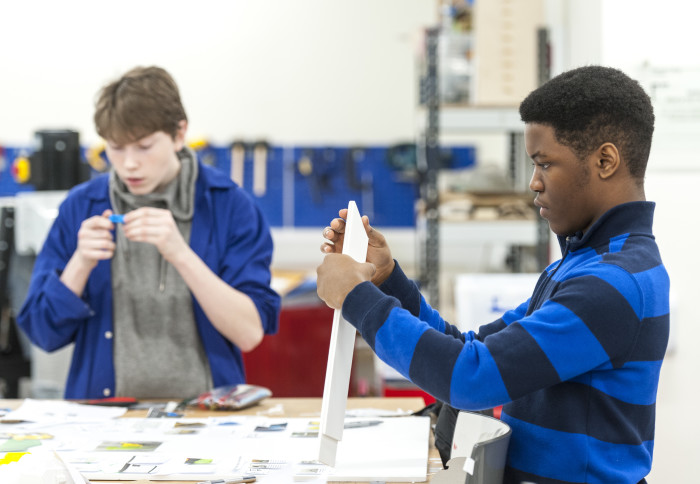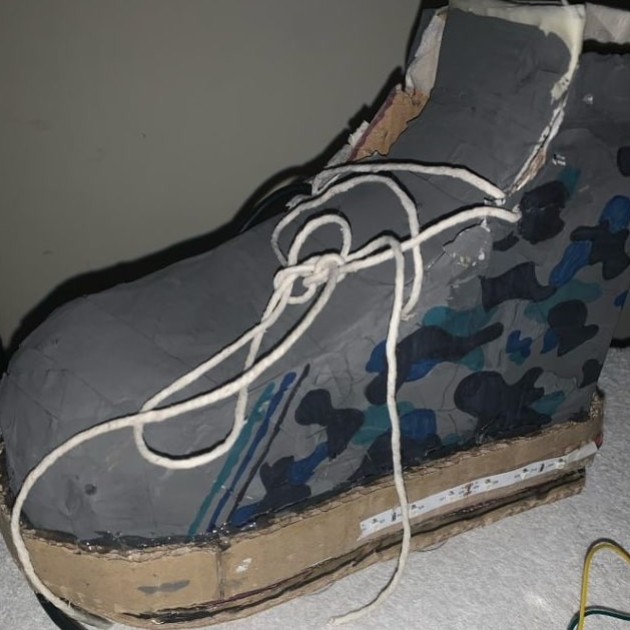Young inventors bring their ideas to life in Imperial’s Maker Challenge

Local students at the Maker Challenge final 2019
Young people from the White City area showcase their making and inventing skills as part of Imperial’s Maker Challenge.
During the past year, pupils from local schools in the White City area have developed their own prototypes – from trainers to walk on walls and environmentally conscious cricket equipment.
Based at the Reach Out Makerspace in The Invention Rooms at Imperial’s White City Campus, The Maker Challenge encourages young people from the local community to get hands-on by creating their own prototype products and gadgets. Since lockdown, the Makerspace team have developed a new virtual Maker Challenge which teaches making and digital skills online.
The programmes came to an end with three finale showcases, where the projects were judged by a panel of experts. Find out more about the winners from each of the three most recent cohorts below.
Walking on walls

Nina, from St Martin-in-the-Field High School for Girls, won joint first place in her cohort for the project Moonwalkers, a pair of trainers that would allow wearers to walk up walls. This is inspired by her passion for the Jordan trainers brand and a desire to create the impossible.
As part of her project, Nina used an Arduino, an open-source electronics platform, and written code to add flashing lights to her trainers, and suction cups on the soles to make them gravity-defying. Nina put sustainability at the forefront of her design with interchangeable soles made from recycled shoes. Her project caught the eye of the judges for its inventiveness and seamless combination of tech and design.
Retro snacks dispenser
Nadia’s project Vender Bender, which was awarded joint first place in the same cohort, is a personal vending machine with a retro 70s inspired design. According to Nadia, a student at Chelsea Academy, other mini vending machines don’t provide the personal touch that Vender Bender offers.
same cohort, is a personal vending machine with a retro 70s inspired design. According to Nadia, a student at Chelsea Academy, other mini vending machines don’t provide the personal touch that Vender Bender offers.
This colourful snack dispenser is programmed with an Arduino and written code and includes a programmable LCD screen. Nadia says the Vender Bender is the perfect way to satisfy cravings, and the judges agreed with her.
Steady hands
 Rafia, from Alperton Community School, won first place in her cohort for her project Writing Aid, a glove that provides the wearer with superior grip while writing using magnetism.
Rafia, from Alperton Community School, won first place in her cohort for her project Writing Aid, a glove that provides the wearer with superior grip while writing using magnetism.
This is inspired by her friend who has cerebral palsy and finds writing difficult due to their hand tremors. Writing Aid tackles the problem of poor grip caused by disabilities, syndromes, old age and other factors. Rafia’s innovative creation caught the eye of the judges for its excellent iterative development and professional pitch.
Making cricket sustainable
The winner of the third cohort was Hamid, from Isleworth and Syon School for Boys, for his project Howzaat.
Inspired by his passion for cricket and mission to be more environmentally conscious, Hamid developed cricket equipment made from 100% recycled polymers. The judges praised his focus on sustainability and real-life applications.
Ideas to reality
Throughout the programme students gained a range of skills from use of 3D printers and laser cutters to product development, team building, and presentation and communication skills to help turn their innovative ideas into reality.
The judges were Dr Annalisa Alexander, the College's Head of Outreach, Kitty Tsui from Deutsche Bank, Karen Bilton from British Council EnglishScore, David Miller from the College’s Advanced Hackspace, and Silje Anderson from the Schools Outreach team.
The Maker Challenge is currently open for applications until Sunday 26 September. The programme takes place over 11 weeks and involves a weekly virtual workshop from 4 October - 14 December. For more information or to apply, visit the Makerspace website.
Article text (excluding photos or graphics) © Imperial College London.
Photos and graphics subject to third party copyright used with permission or © Imperial College London.
Reporter
Joanna Wilson
Communications Division